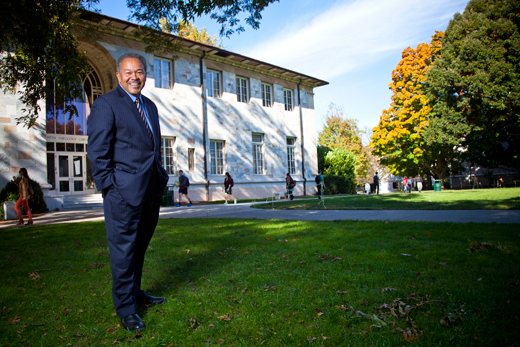Robert Franklin is no stranger to asking the hard questions. As Emory's newly appointed senior adviser for community and diversity to the provost and other senior administrators, Franklin now has an opportunity to explore such questions with the Emory community.
This appointment marks his third at the University, where he previously served as Presidential Distinguished Professor of Social Ethics, director of Black Church Studies at Candler School of Theology, and senior fellow at Emory's Center for the Study of Law and Religion. He also led the University-wide strategic initiative, Confronting the Human Condition and Human Experience.
Franklin is approaching his current role by "listening strategically and heedfully to people throughout the campus. I'm interested in assessing where we are on issues of diversity," he says, "on affirming the progress that has been made, and at the appropriate time, advocating for changes and the resources needed to create a community where we can put forward our best selves."
Franklin will be benchmarking Emory's diversity programs against those at other national institutions. To this task, he brings a deep network of personal ties and firsthand experience. President emeritus of Morehouse College, Franklin has taught at Harvard University, the University of Chicago, and Colgate-Rochester Divinity School as well as Emory, and he just completed a year as a visiting scholar in residence at Stanford University's MLK Jr. Research and Education Institute.
Ordained as a minister in both the American Baptist Churches USA and the Church of God in Christ, Franklin earned his MDiv from Harvard and a PhD in ethics and society, religion and the social sciences from the University of Chicago. He completed additional international studies at the University of Durham in the United Kingdom, and he has held pastoral positions at Harvard, St. Bernard Hospital in Chicago, and the Chautauqua Institution in New York.
In his 2007 book, "Crisis in the Village," Franklin identified key crises in African American communities, probing rising rates of absent fathers and growing tensions in churches seeking to serve upwardly mobile parishioners while caring for the poorest members of the community. In his blog, Frankly Speaking, he diagnosed the difficult truth, for example, that African American "boys are in trouble." For the Annie E. Casey Foundation, he has searched for solutions to alleviate poverty and strengthen fragile families. He has pressed similar questions as a program officer in human rights and social justice at the Ford Foundation. And, as a member of an Aspen Institute Working Group on Religious Pluralism, he has challenged religious communities to implement Martin Luther King's invitation to celebrate common ground as a strategy for peacemaking among nations and communities.
In the first weeks of being back on campus, Franklin senses the strength of Emory's vision of diversity, and he is committed to identifying where and how the University can deepen its commitments to diversity in practice. For example, in responding to a question about faculty recruitment and retention, he wants to signal to junior faculty of color in particular that Emory is a place where they will be encouraged and supported and experience "a sense of what we can do at our best."
To help the University move ahead actively on this front, Franklin aims to ask apt questions and listen with care to the answers. "All my goals and hopes are predicated on listening," he says.

